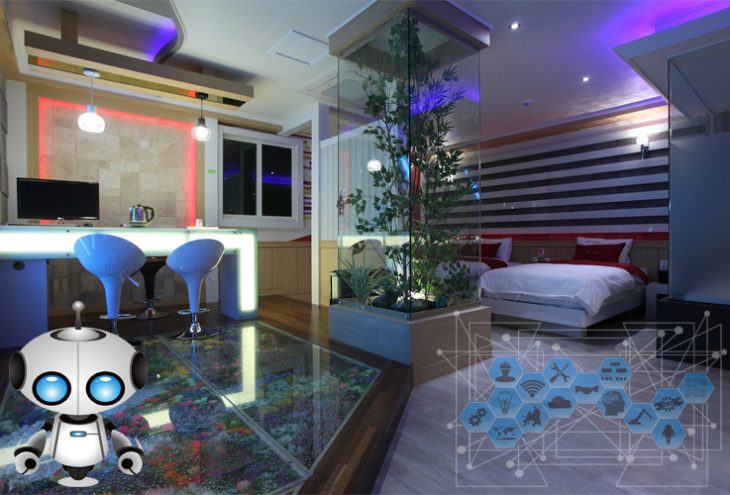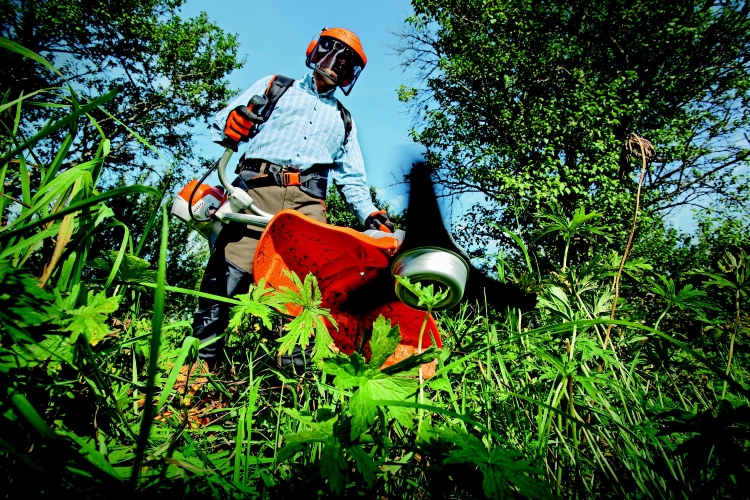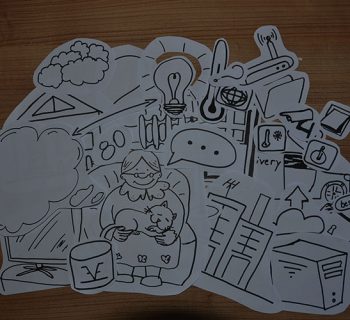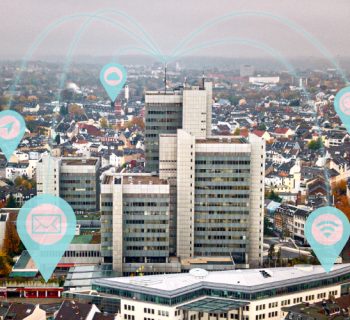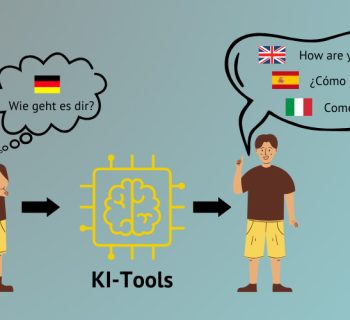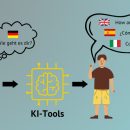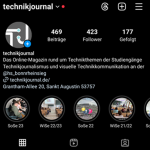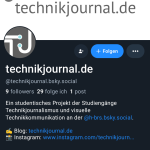Robotic check in, controlling mood rooms and who-is-at-the-bar apps are what travellers want. Personal experience mixed with technology – the hotel of the future. But the danger for hotels to lose their focus is high, so how do they meet the digital needs of their customers? //by Victoria Wegmann
Imagine entering a high-tech hotel - a robot welcomes, while another carries your luggage to your room. No human is insight. Is this how the hotel of tomorrow looks like? Not for the next years. Probably there is a wow-effect if you enter your new short-term home, but not the way you expect it. Hotels have already significantly changed a lot in the way they use their spaces, for instance turning lobbies into a more living room environment. Instead of visible high Technology hotels could have space for a traveller’s personal devices, like a mobile phone that immediately provide social information about who might already be at the bar or pool. Who might be potential business or romantic partners? The space itself won’t be so different, but the way information flows from the space to you will be.
Artificial Intelligence can make your dream come true
A representative survey of 1012 consumers on behalf of the digital association Bitkom shows that one in four (24 percent) customers would like to use a reception and check in from a robot that eliminates waiting time. Machine learning will help customers with daily routines, they can learn about special features that the guests likes and automatically prepare it for him or her. This is already happening with features called Fast Pass, press reader and mood rooms. Juliane Voss, Senior Communication and Content Manager from Northern Europe in Berlin states: "The Fast Pass is right now in the pilot phase and will be available for guests who have booked via NH website or app. If the pilot goes well, it is expected to take off in all hotels in autumn." Future hotels can offer more possibilities for personalization. Still it’s very important for hotels not to lose the focus and to ensure that the "human touch" is maintained.
The features Fast pass and press reader
Online check in, check out and the choice of your room via smartphone will be available in NH hotels throughout Europe. As in the plane, the hotel guest can choose his room according to personal preference. For example, you could choose a room to be near or far away from the elevator, on which floor it is located, or if it contains a double or single bed. The process should be very simple: two days before your stay you will receive an email to check in online, with a link to the room’s location. When the guest arrives, there is a counter where he can pick up the room key card himself. Juliane Voss, from the NH hotels states: "I think there is even more communication, but on other topics, because digitization ensures standardization, time is saved." The Brenners Park Hotel & Spa in Baden-Baden, Germany, also offers a popular form of digital transformation: the press reader. It offers about 4000 newspapers from over 60 countries in various languages. So, every guest can read his personal newspaper in his own language either on a tablet or printed.
A room that changes with your mood
The Bitkom survey showed that 28 percent of respondents would like a hotel room that adapts to the guests. These are the so-called Mood Rooms, and are available at two NH Collection hotels. Last year in October four mood rooms opened in Madrid in the NH Collection Eurobuilding and from September they will also be available in Germany at NH Collection Berlin Mitte at Checkpoint Charlie. Guests can customize the hotel room to their mood and you can control light, temperature, music and the curtains with a tablet. You either get this at check in or it is already in your room when you check in online. There are different basic moods, like the cocktail mood that you can choose when you are in a good mood. The music is upbeat and the colors become more stimulating, with the light bathing things in orange and reds. There are both main categories and subcategories. However, if you don't want to select a mood, you can turn it off and listen to your own music via Bluetooth.
Robot concierges and chatbots
Paying bills or the booking process is easy to do with a machine but if there is a problem, people like to be taken care of by a person. This is one of the main tasks for Assistant Chef Concierge and member of the Assosioation of the Golden Keys, Les Clefs d‘Or, Sascha Domm, who works in the Brenners Park Hotel & Spa. "Les Clefs d’Or" (translated as The Golden Keys) is a professional association of hotel concierges, with approximately 4000 members working in over 80 countries and 530 destinations. Domm must take care of the guest’s interests, plan excursions and give recommendations: "There is no wish too fancy or too complex," states Domm, "a no doesn’t exist here". By means of facial expressions, gestures and the right questions, he determines what guests want. Therefore, he’s not afraid to be replaced by a robot concierge because they can’t approach the guest proactively or make decisions for indecisive guests. "Robot concierges aren't something that affects my work now, high touch is more important to us than high tech, that's what we live by." The use of chatbots on the Brenner’s website is one of the chances to use technology in a way that makes sense for Domm. In his view, people still long for direct contact after all. "You can't digitize everything and perhaps you shouldn't, because the most important thing is that at the end of the day there is more time for guest engagement."
Data protection and safety
Traveling a lot means you must protect your data more, as you give many of your information to hotels. Tobias Warnecke has been a political consultant for the German Hotel Association (IHA) for eight years in the areas of market research and online marketing. The IHA observes the impact of digitalization on the hotel industry and tries to fulfil political conditions in the field of digitalization. "There will never be 100 percent protection, because unfortunately hackers always find ways to get into the system", says Warnecke. In his opinion there should be more invested in data protection, and this applies not only to firewalls, but also to staff training. In hotels it’s easy to collect data about the preferences of guests and allergies, which is a big advantage in the service area. However, these are highly sensitive data and when you collect them, you need the customer's consent. But, there is another special feature in Germany: "A complete digital check in without a person or reception is not legally possible, since it is still mandatory to fill out a registration form by hand. This is a legal hurdle." The new Basic Data Protection Ordinance (DSGVO) does not allow the registration form to be digitised, and since this is relatively new, this will not change for the time being.
Potential gaps for safety issues
Prof. Dr. Willy Legrand, from the Department of Hospitality, Tourism and Event Management at the IUBH International University thinks that the DSGVO changes the way we handled data before: "Data conception will be something of great importance especially in high tech hotels." Furthermore, he thinks that safety in a virtual world is relative: "Someone I met once said: the best safety online is if you turn your laptop of and unplug it. And he’s right with that." Opening a door via smartphone for example would create potentional gaps for safety issues. Safety issues are not unfamiliar: there are Hotels who have been hacked on their keycardsystems in Switzerland last year, so people were kept out of their rooms. Legrand explains: “You can’t be trapped inside your room because there needs to be always a manual way out, but if the room is hacked, you couldn’t access your room." So, these safety problems exist in certain ways already and with a hotel where more and more will be managed by technology, there’s always the potencial danger of hacking. Therefore, every hotel should have a backup which is manual, and this again involves people.
High from High Tech?
More and more people can no longer live without technology in their everyday lives, which is why digital detox is becoming increasingly popular. In the Villa Stephanie of the Brenner Park Hotel & Spa, for example, there are suites that have a kill switch: this is a switch near the bed that ensures that all radiation, such as from WiFi or from cables is switched off when activated. The walls are specially primed to shield any signals so that the guest can consciously omit the technology.
Nevertheless, Warnecke sees potential, as digitisation has started in the hotel industry at an early stage with booking platforms and online ratings. Germany is currently very popular with hotel chains, as many hotels are looking for suitable locations here. This simply takes longer, because Germany is quite densely populated, leaving less attractive places for new hotels to be built.
Digitisation can help to better control the sustainability aspects and increases savings effects. Willy Legrand states: “Sustainability will play a very important role because technology is hungry for resources and efficiency is key.” With a control tool, you can balance the air conditioning much more precisely and ensure that it only runs when someone is in the room. The amount of the gadgets will be so high that hotels will need even more technology to better manage the high level of energy.

Prof. Dr. Willy Legrand, Professor for Department of Hospitality, Tourism and Event Management, Image source: IUBH
The future trends for High Tech hotels can be divided into 3 parts:
- The Hotel of the future will produce, which means the hotel as a building will be able to produce energy, food and water. It is really about decentralization of production, beyond on the traditional “reduce, reuse and recycle”, this includes building an independent and short food production cycle.
2. Technology attracts the consumers. Hotels are great places to showcase new technologies but at the same time it still is a lot about people. Human interactions are where to value added in hospitality. The use of Technology is great for operational processes but when someone at the reception looks a customer in the eyes, it’s quite unique, and machines can’t do this. The true luxury in the future may be based on human interactions and people living in high tech countries/cities will be looking for that because they miss it.
3. Curated experience and personalization are very important. Consumers will want smart individualised rooms and they want to control all features with devices or their voice. It’s important to offer the travellers a unique experience.
Die Autorin

Victoria Wegmann

